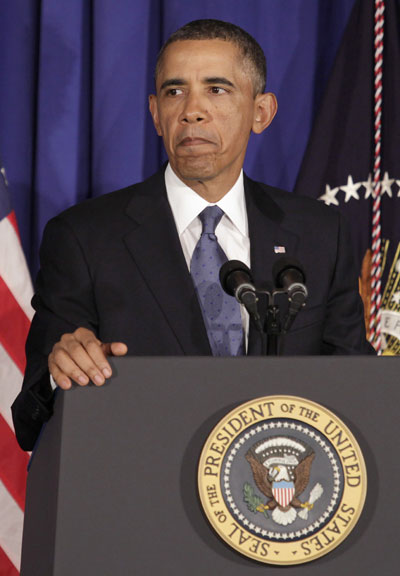US lawmakers fail to reach deal
Updated: 2013-03-02 11:12
By Joseph Boris and Chen Weihua in Washington (China Daily)
|
|||||||||||
Mandatory spending cuts set to start on Friday after talks break down
With time running out, US lawmakers failed to reach an 11th-hour deal to avoid $85 billion in across-the-board spending cuts in the federal government, which were set to take effect in the country on Friday.
In the Senate, one bill each from Democrats and Republicans died without attracting enough support to be brought to a formal vote.
 |
|
US President Barack Obama was scheduled to meet the leaders of the Democratic and Republican parties in the Senate and the House of Representatives on Friday after both parties failed to reach an agreement over the federal budget. Yuri Gripas / Reuters |
For now, it's unclear what effects the cuts, collectively known as the sequester, may have on the US public. President Barack Obama and others in his administration have warned that furloughs of federal workers could result in long lines and delays at US airports, the closing of national parks, and layoffs of teachers.
With the deadline for avoiding the sequester looming, exhausting the last chance for Congress to dodge the measure that Congress and Obama put in place in 2011, leaders of both parties in the Senate and the House of Representatives were to meet with the president on Friday. Obama summoned the four lawmakers to discuss next steps.
Without a deal, Obama must put sequestration into effect by midnight Friday, US Eastern Daylight Time (1 pm Saturday Beijing Time).
Debate over the sequester has been marked by partisan accusations of who's to blame and which party's agenda would reduce the federal budget deficit without stunting economic growth. The gridlock in Congress has continued since enactment of the Budget Control Act of 2011, which mandated cuts so deep and potentially unpopular that lawmakers claimed they would be pressured to find alternatives.
The cuts, divided between the defense budget and nearly all other forms of government spending, would total $1.2 trillion over nine years, in addition to the $85 billion affecting the remainder of Washington's fiscal year, which ends on Sept 30.
For Democrats, including Obama, negotiations on spending cuts must include tax increases on wealthy Americans, which Republican congressional leaders and many of the party's members oppose.
On Thursday, Obama criticized Republican senators for spurning the Democrats' proposal and accused them of siding with the rich on fiscal policy.
Related Stories
US steps up campaign to avoid spending cuts 2013-02-26 09:50
US Treasury Secretary nominee warns of spending cuts 2013-02-14 02:51
Obama urges Congress to balance spending cuts, tax reform 2013-02-10 00:23
Obama pushes for government spending cuts delay 2013-02-06 03:59
US budget chief: Automatic spending cuts likely 2013-01-28 13:32
Today's Top News
Police continue manhunt for 2nd bombing suspect
H7N9 flu transmission studied
8% growth predicted for Q2
Nuke reactor gets foreign contract
First couple on Time's list of most influential
'Green' awareness levels drop in Beijing
Palace Museum spruces up
Trading channels 'need to broaden'
Hot Topics
Lunar probe , China growth forecasts, Emission rules get tougher, China seen through 'colored lens', International board,
Editor's Picks

|

|

|

|

|

|





